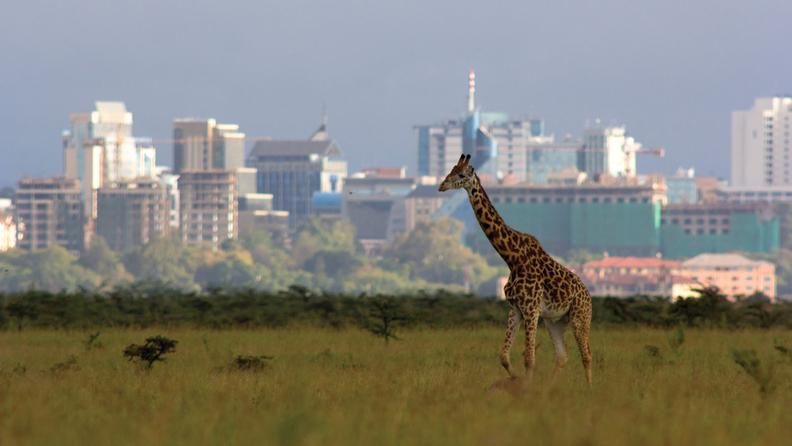Africa for years has struggled to attract the notice of — and money from — American pension funds.
But in the past two years, U.S. pension fund trustees and other billion-dollar asset owners appear more open to investing in some of Africa’s 50-plus countries, particularly in infrastructure.
Institutional investors are encouraged by a U.S. government-led geopolitical charm offensive in Africa, and are wagering on higher-risk returns amid inflation, Fed rate hikes and uneven portfolio performance at home.
And pension funds may one day view Africa as a potential ESG or DEI investment destination, especially those with social impact as a portfolio goal, investors and consultants said.
In the past few years, the City of Hartford Pension Commission, City of Philadelphia’s Board of Pensions and Retirement and the Public School Teachers’ Pension & Retirement Fund of Chicago have invested $5 million, $50 million and $10 million, respectively, into a $900 million vehicle called African Development Partners III. The fund is advised by British private equity firm Development Partners International LLP.
Alongside the Americans were Africans’ own pension funds: the Eskom Pension and Provident Fund, one of the largest in South Africa with 170 billion rand ($10.5 billion) in assets as of June 30, which allocated $20 million to ADP III.
Kenyan pension funds also made investments in ADP III, including KenGen Defined Contributions Scheme and Banki Kuu Pension Scheme 2012.
That co-investment model with local pension funds seems to give American pension trustees some comfort, said Richard Nuzum, executive director of investments and global chief investment strategist of Mercer Investments LLC.
“Investing in vehicles alongside local pensions mitigates political risks, but in a softer way,” Mr. Nuzum said.
Investors visit Africa
Eric Newman, a trustee for the $1 billion City of Stamford (Conn.) Classified Employees Retirement Funds, recently visited Africa as part of a U.S. government delegation, one of several sponsored each year through Prosper Africa, a White House initiative to increase trade and investment between African nations and the U.S.
Mr. Newman returned from the latest U.S.-led African delegation trip as an optimist for investing in the continent. Mr. Newman is responsible for treasury, investment management and pension fund accounting for the city and is a trustee for the city’s combined pension plans.
“Perceived risk is always magnified vs. reality,” he said. “Africa’s private equity-sponsored portfolio companies have less leverage than U.S.-sponsored private equity, resulting in stronger balance sheets.”
U.S. asset owners have learned more about investing in African projects via ProsperAfrica.gov. The initiative brings representatives of U.S. pension funds, endowments, and foundations to visit African countries four or five times a year.
The continent is expected to have the largest, youngest workforce by 2040 and the world’s fastest-growing companies, said Cameron Khosrowshahi, Washington-based senior investment adviser for Prosper Africa, in an interview. Active deals throughout the African continent that are supported by Prosper Africa attracted $40 billion since 2018 from pension funds and other investors, he said.
“U.S. pension funds recognize that Africa is a good place to find investment returns,” noting that they’re are looking for faster rates of growth than in other markets, Mr. Khosrowshahi said.
Investment in sustainable infrastructure also hits some ESG high notes, he said, adding that “we see ESG as a shared bonus. In a developing part of the world, the impact of climate change will affect these areas disproportionately.”
Venture capital dollars are still small, totaling $7.6 billion in 2022. However, last year was the highest year on record for deal volumes in Africa in the past 10 years, and a 46% year-over-year increase, according to the Africa Private Capital Association, an industry group.
Demographic destiny
Africa’s total population today is more than 1.3 billion. Since 2000, the continent has grown by more than half a billion people. That’s the equivalent of the U.S. and Brazil’s populations combined since the start of this century, according to a 2021 Mercer report.
Insurance companies have taken notice. In 2021, Aflac Global Investments, the $122 billion asset management subsidiary of Aflac Inc., partnered with the $10 billion Denham Capital — a U.K. global sustainable infrastructure, energy and resources investment firm — for a $2 billion investment in Africa. The Denham Sustainable Infrastructure investment was earmarked to launch a new debt platform investing primarily in the senior debt of sustainable infrastructure.
Also in 2021, Singapore’s Temasek invested $500 million and took a stake in London-based LeapFrog Investments, which makes Asia and Africa bets through private equity funds.
Mercer’s Mr. Nuzum sees parallels between Africa’s future and those of Asia and Southeast Asia in the 1990s, “when Japanese auto companies moved production to Thailand and Vietnam was finally opening up.”
He pointed to the African Private Capital Association’s latest 2022 figures: Out of 34 limited partners in the study, 65% of those that had invested in Africa had plans to increase their allocations over the next three years, he said. “It’s a small value, but of those invested, 86% are increasing or maintaining their allocation.”
Other managers also seeing interest from U.S. pension plans are Ninety One and All Weather Capital Pty Ltd., mainly in private deals, as there are few liquid stock markets.
U.S. investors have only “dipped their toes in the water a few times over past decade or so,” said Cape Town-based Kobi Sam, director of credit opportunities at the $163 billion asset manager Ninety One.
Around 2015, “a few public pensions allocated to private equity in Africa,” including Missouri State Employees’ Retirement System and the Washington State Investment Board, he said.
Now, however, “We’re seeing more interest in our private credit strategies, from public pensions as well as insurance companies and endowments/foundations and family offices.”
Outside of South Africa, the continent doesn’t “yet allow meaningful deployment of capital at liquidity profiles that will be tolerable to most institutional investors,” added Neal Smith, emerging markets portfolio manager at 20 billion rand ($1.1 billion) All Weather Capital in Cape Town. All Weather is an independent, minority-owned asset manager with long only and multiasset hedge funds.
“U.S. interest in Africa is coming off of nearly a zero base,” Mr. Smith said, “so there’s only upside.”
Consultants aren’t convinced
Proponents of Africa say they tussle with their consultants to even begin due diligence. Consulting firms often still view its frontier and emerging markets as just a niche.
“I haven’t looked at South African hedge funds in years,” said Patrick Ghali, co-founder and managing partner of hedge fund advisory firm Sussex Partners U.K. Ltd., London, in an email. “Last time I looked, the industry was tiny with just a few players, albeit some had decent returns.”
He added: “For our clients this was always and remains a niche market for them.”
Sources said there are few liquid markets on the continent, although South Africa represented 3.3% of the MSCI Emerging Markets index as of May 16.
So it takes real pressure from board members to start investing.
“You as a pension fund trustee have to insist to your consultant or consulting firm that you want to investigate Africa,” said Aymeric Saha, chief executive of Washington-based MiDA Advisors. MiDA co-manages the Africa Institutional Investors Advisory Council, whose members include U.S. pension funds, insurance companies, endowments and foundations, and their investments consultants. “Otherwise, they won’t bring it to you as a potential investment,” he said.
“Go on one of the (U.S. government) trips,” said Gwendolyn Smith, Atlanta, Ga.-based chair of the council. “Although you don’t have to go to Africa to understand the depth of opportunity,” Ms. Smith said. She agreed that pension plan trustees and committees “have to demand the consultants’ attention. If they’re allowing consultants to make decisions at every turn, we’ll never be able to unlock the capital.”
Searching for growth
Angela Miller-May, now chief investment officer of the $49.5 billion Illinois Municipal Retirement System, Oak Brook, led the vanguard of pension plans investing in Africa.
In her prior post as CIO of the now $11.1 billion Chicago Public School Teachers’ Pensions & Retirement Fund, she invested in African investment strategies. Asked why the teachers’ fund initially invested in Africa, Ms. Miller-May said in a statement that “after the global financial crisis, we were in an economic environment with low returns and slow growth and CPF needed to search for strategies, sectors and geographies that offered growth opportunities.”
In 2016, the fund’s investment team “began to educate themselves on the investible opportunities in emerging markets, specifically Africa,” Ms. Miller-May said.
Ms. Miller-May and the director made several trips to Africa through the Trump and Biden administrations’ delegations, which continue today.
“It was on the first trip (to Africa) in 2017 that we understood the difference between the perceived risk and the realty of the vast opportunities that Africa held,” she said.
“Investing in Africa is a perfect fit for an underfunded pension fund seeking yield and returns and a competent, qualified, African-based investment manager seeking access to capital,” Ms. Miller-May said.
The Chicago teachers fund in 2019 invested a total of $20 million in two funds managed by firms that invested in diverse exposure across non-core countries and across pan-Africa, Ms. Miller-May said. The private equity funds are AFIG Fund II, managed by Advanced Finance and Development Partners LLP; and African Development Partners III, which is managed by London-based Development Partners International LLP. They remain as pension fund managers today.
Now at Illinois Municipal, Ms. Miller-May said in her email that “prior to recommending an investment (in Africa), we have to educate our board on the value proposition and risk of the investment strategy and geography inclusive of developed and emerging markets.”
Carlton W. Lenoir Sr., current executive director of the Chicago teachers fund, said in an email that “since the 1990s, the fund has encouraged diversity and inclusion by providing opportunities to minorities, women and persons with disabilities to conduct business with the fund.”
“We make investments with a long-term lens and at this point, it’s too early in the life cycle to determine results,” Mr. Lenoir said, adding “we know as that as Africa becomes integrated into global markets, Africa has long-term prospects for strong economic growth, driven by its demographics. We believe that the investments we have made will capitalize on those market forces.”
Investment commitments in Africa tend to start small, said Mr. Newman of Stamford’s pension plans.
For example, the $91.6 billion Massachusetts Pension Reserves Investment Management Board, Boston, “hasn’t recently invested in a dedicated African-based fund,” a PRIM spokesman said in an email.
However, through its emerging markets exposure — both equity and fixed income — PRIM has approximately $100 million, or approximately 0.1% of fund assets, invested African countries and companies, the spokesman said. He noted that PRIM’s investment managers “have full discretion within approved investment guidelines to invest or not invest in African countries or companies.”
Emerging markets has 85% of the world’s population, 63% of the world’s commodities, 77% of the land, 33% of the financial markets, and 42% of the world’s GDP, yet institutional investors invest less than 5% of their allocation into the EM and less than 1% into Africa, according to Mr. Newman.
“Public pension plans are freighters in the ocean and they take time to shift course,” said Mr. Newman, whose Stamford pension plan has yet to invest. But once set, “the trade routes established become long term and others will follow the path. Africa will produce long-term high-quality returns and meaningful impact.”

